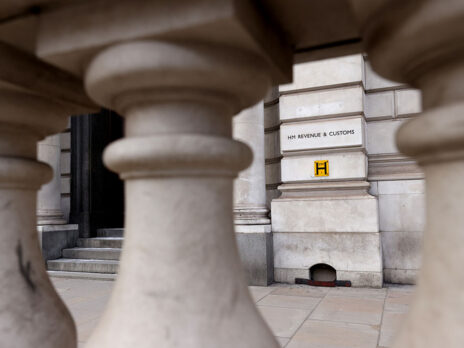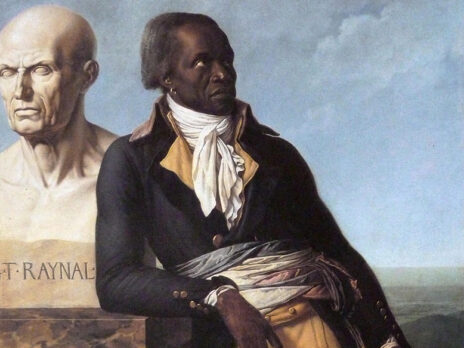Jacques-Louis David’s painting Death of Marat contains what might be the first visual representation of paper money in Western art. On the desk beside the bathtub in which the revolutionary lies is a 5-livre issue nicknamed a “corset”. In David’s scene, Marat is about to send the note to a war widow when he is assassinated by the Girondin sympathiser Charlotte Corday. For the art critic TJ Clark, the banknote has none of the “visual weight that belongs to the other main objects” in the painting and might be overlooked. But the presence of the note – a synecdoche for the revolutionary economy as a whole – captures the centrality of money in 1790s France.
Less than a year after the fall of the Bastille in July 1789, dwindling revolutionary finances forced the Constituent Assembly to issue bonds (assignats) to prevent state bankruptcy. By April 1790, to address a liquidity crisis, the paper certificate was declared legal tender; that autumn, the Assembly abolished interest on assignats and issued 800 million more. The following year, hundreds of millions in low-denomination paper began to circulate.
With the assignat backed by the value of newly expropriated property from the Crown, Church and aristocratic émigrés, the Assembly had unintentionally established one of the earliest fiat moneys – mere paper, the value of which was guaranteed only by the word of the state. Ultimately, billions of assignats were issued, to pay for the extraordinary costs the revolution incurred fighting foreign wars, suppressing internal opposition, and in trying to quash the slave rebellion in Saint-Domingue (Haiti).
[See also: The UK has among the lowest number of bank holidays compared to Europe]
The result was calamitous inflation. The revolution failed to create public trust in money, nor could it generate a sense of political stability or national communal solidarity. After the onset of the Terror in 1793, revolutionaries could only try and impose these through price controls (Laws of the General Maximum) and violently enforcing the dictum – attributed to Mirabeau – that, “To doubt the value of the assignat is to doubt the Revolution, and that is a crime.” By 1796, the experiment was terminated.
The historian Stefan Eich reflects on the assignat in The Currency of Politics: The Political Theory of Money from Aristotle to Keynes, because it captures in almost exaggerated form the book’s central theme: money is never just a technical solution to the problem of exchange. It is always “political currency”, and always about power. It’s not just that money can be used for purposes good or ill, or that those who have lots of it tend to be powerful, but rather that the very existence of money enmeshes us in relations that, as the French revolutionaries realised, contain both promise and peril. To understand money as an “institution” is to recognise its chronic political qualities.
For Eich, money is “deeply ambivalent”, always “suspended between trust and violence”. It both binds political communities and is one of the means to tear them apart. It is a shared commons that also facilitates inequality and conflict. The Currency of Politics is an investigation of this “two-sidedness” haunting the politics and political theory of money, from classical Greece to the Covid-19 pandemic.
Eich’s goal is to show how these complexities always characterise money. It is hard to imagine more glaring evidence that money is founded in “convention” than something created out of nothing by a citizen’s assembly in the midst of revolution. It also reminds us that every single thing about money is socially determined: what counts as money; by whom and where it is accepted as money; its purchasing power; the physical form it takes (coin, paper, code); what “backs” its value; who produces or issues it: all of it is the outcome of social relations. There is nothing God-given or “natural” about money, but it is constantly treated as if it were beyond human intervention, something to whose order we submit.
[See also: The coming economic storm]
Eich constructs a genealogy of monetary thought that exposes the ways money has been removed from the realm of public debate and made “invisible” by the “politics of monetary depoliticization”. Tracing this phenomenon in the work of five thinkers – Aristotle, John Locke, Johann Gottlieb Fichte, Karl Marx and John Maynard Keynes – Eich remains alert to the ambivalences and contradictions at the heart of their writings. None but Keynes are usually thought of as monetary theorists, which makes for a fascinating recasting of their work. Eich connects ideas about money to larger political and theoretical commitments, and to the long-term evolution of European liberalism. Aristotle might seem an outlier, but for Eich’s purposes, the Athenian’s commitment to the ways money could integrate a community laid a political foundation. Although he recognised the ways money facilitated the asocial accumulation of material wealth, for Aristotle money was also the “institution that makes divergent needs compatible”; as such, it was a building block of political community: “Polis and coinage developed in parallel.”

This is the fundamental “ambivalence” that troubled future thinkers. None deny it; the question is what to do about it. Locke’s answer, which he elaborated during Britain’s coinage crisis of the 1690s, is closest to the common sense that prevails in the Global North today. For Locke, the key to a monetary economy was trust. He took participation in monetary exchange as proof of assent to the money-ness of gold and silver; trust in the stability of their values underwrote trust in the social order. When the silver content of the royally minted coins of his era was so reduced by clipping and piercing that the coins were no longer worth their face value, and no longer accepted in Europe to pay for the war with France, William III was forced to choose between devaluation and wholesale recoinage. Against those pushing for devaluation, Locke successfully argued for wholesale silver recoinage in the interest of maintaining trust in the coin.
The result, the Great Recoinage of 1696, might be thought of as an early, severe variation on the Volcker shock of the late 1970s and early 1980s, when the US Federal Reserve, under its chairman Paul Volcker, drastically raised interest rates to subdue inflation, initiating a recession and credit crisis that spread across the world. In the late 1690s, with the Royal Mint too slow to replace demonetised coinage, the nominal value of specie, or coins, in Britain fell by about 37 per cent in the first six months of 1696; silver in circulation shrank by 45 per cent, and prices fell drastically throughout the year. The result – like the Volcker shock – was a full-scale macroeconomic reset in favour of creditors, in which, as Eich puts it, “the pain of restoring trust was strikingly unevenly distributed”, taking a terrible toll on debtors, the domestic economy and the war effort. Among the more significant outcomes was not only social devastation among the British poor, but the shift from bimetallism – commodity money backed by gold and silver – to the gold standard. It also gave further impetus to colonial extraction as a means to rescue the British balance of trade, and the so-called financial revolution of the late 17th century, driven by an explosion in public debt and the proliferation of substitutes for money.
For Locke, all this was the price of maintaining trust in the sovereign order. As Eich puts it, Locke’s politics of monetary depoliticisation took the form of being “intervened in the name of nonintervention”. This is basically the logic behind central bank independence in the post-Volcker era – that monetary policy must be independent of elected government – and it captures what Eich calls the “paradox of all modern liberal political theories of money”. According to contemporary macroeconomic common sense, the competing claims that animate modern democracy give it an “inflationary bias”. Consequently, the “political and conventional nature of money is enforced by the state but at the same time shielded against direct political interference in an attempt to establish money as somehow beyond politics”. This sensibility is explicit in modern central banking today.
Locke’s emphasis on money as a way of creating trust in society was upended by the French Revolution. But while the use of the assignat failed, Britain’s Suspension Period between 1797 and 1821 – when it abandoned the gold standard – seemed to demonstrate that despite centuries of doomsaying, paper fiat money was not a recipe for immediate disaster, but could enable the state to realise otherwise impossible goals (such as paying for the Napoleonic Wars). Having suspended the convertibility of paper into gold, the Bank of England “opened a Pandora’s box of modern monetary politics”, including Fichte’s The Closed Commercial State (1800). This radical intervention in political thought described a quasi-utopian economy in which closed borders and fiat money made rational governance, self-sufficiency and greater equality possible. Eich argues that Fichte’s proposal is best thought of as a “monetary social contract”, designed to take enlightened advantage of “the fluidity and the reach of the modern state”, unfettered by quasi-religious fidelity to the mythology of gold and silver.
By the time Marx began his studies of political economy in London in the 1850s, not only had convertibility been restored in Britain, but gold’s “quasi-religious” status had been reasserted, in no small part by means of British free trade imperialism. The era of high liberalism, industrialisation and empire in which Marx wrote was also one in which credit markets proliferated and new financial instruments knitted together stocks and flows of increasingly consolidated global capital. Crises – such as the Panic of 1857, when a ship loaded with California gold sank before it could deliver its cargo to overextended New York banks, precipitating a nationwide banking crisis that quickly spread to British financial markets – now crossed oceans in days.
Eich’s analysis of Marx’s monetary thought is truly novel. Marx is often believed to have dedicated less time to monetary questions; many consider him a straightforward commodity theorist like the majority of his Victorian peers. But Eich presents a Marx who spent years obsessing over money, currency policy, credit and banking. Marx’s close study of the history of money and monetary theory informed both his critique of utopian-socialists, like Pierre-Joseph Proudhon, and his analyses of capital, which most historians assume elides a political theory of money by invoking money as merely a moment in the circulation of value that creates capital and allows it to accumulate: this is captured most famously in his “general formula” of capital, M–C–M’, the transformation from money, to commodity, then back to money again – except there’s more of it.
Eich argues that this misconception is due to the fact that in Capital (1867), Marx relegated money to the footnotes. The result is an argument that seems to suggest that money is virtually immune to politicisation. Eich’s point is not that the rest of us have been “wrong”: Marx does often seem to say exactly this, such as in the Grundrisse (1858). But he also wrote that “money is the community of men itself” – this is Eich’s Marx.
The latter parts of The Currency of Politics are dedicated to Keynes and the post-Bretton Woods era. Keynes rejected the common assumption among economists that money was a neutral feature of economic life, and dedicated himself to understanding both the economic functions of money and their political implications. His General Theory of Employment, Interest and Money (1936) can be read as a less utopian version of Fichte’s Closed Commercial State, in which money is the primary means by which to realise “the fluidity and the reach of the modern state”. Money is what helps cushion us from the economic volatility of modern life. Free-marketeers’ demand for wage flexibility (and hence no minimum wages, no unions and so on) invites disaster: the fact that wages are paid in money, and money alone, is what stabilises the system.
[See also: Keynes and the cost of peace]
Eich’s account of Keynes’s failed effort at Bretton Woods to establish an International Clearing Union (ICU), based on a global currency called the “bancor”, excels at linking his earlier monetary theory to his ideas about economic policy in the Cold War era. But Eich participates in a routine celebration of Keynes’s genius that he doesn’t entirely deserve. He was more of a medium than a seer, less a gifted oracle than someone who managed to sense and describe the tumult of his era in terms his elite peers could understand. If he appeals so strongly to so many people now, the reasons are not so very different.
That is not to say that the world wouldn’t have been a better place if Bretton Woods had listened to Keynes and established the ICU. Instead, Lockeanism became, in Eich’s words, the “orthodoxy of modern times”. The International Monetary Fund became a “depoliticization machine”, its “denial of the political nature of money” ready “proof of its political agenda”. The political supremacy attached to the price level that characterises modern “central bank capitalism” – which pretends, with Locke (and Milton Friedman and Margaret Thatcher and Christine Lagarde), to be above politics – has become the rule against which any temporary “softening” is measured and denounced. It is hard to know if the doctrinaire attachment to the lie of apolitical money is a charade by finance and elites – because it so clearly favours their wallets and balance sheets – or if it is a true and honest faith, however self-interestedly delusional.
[See also: Would there still have been climate change under socialism?]
Without answering this question directly, Eich’s book is ultimately a call to revive democratic the debate about money. The problem – the persistence of which makes this excellent book no less worthwhile – is what that means in practice. Whatever democratic monetary politics looks like, it cannot escape the “ambivalence” of money that is central to The Currency of Politics. Indeed, ambivalence is not just the subject of Eich’s book, it is also its dominant tone. The book is filled with figures like the dilemma and the “double-edged sword”; “for better or worse” is a common frame. This is understandable, for exactly the reasons Eich lays out. In his study of Marx, the Japanese philosopher Kojin Karatani remarked that the “ultimate conclusion of Capital is the antinomy: money should exist, money should not exist”. This remains today’s antinomy. The trouble is, money does exist. Now what? Eich does not tell us what to do, but he does show us something can be done.
The Currency of Politics: The Political Theory of Money from Aristotle to Keynes
Stefan Eich
Princeton, 344pp, £28






